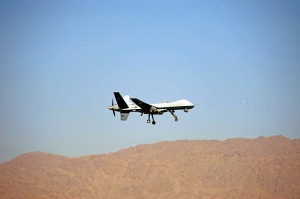Drones v. Pirates
September 21, 2011 Leave a comment
In today’s Wall Street Journal, it is reported that the U.S. is deploying armed drones to the island nation of the Seychelles in order to strike militant targets and, if and when necessary, Somali pirates:
A senior defense official said the U.S. hasn’t yet used the Reapers deployed the Seychelles to conduct armed reconnaissance on pirate ships, but the option is open to use the drones to strike at pirates who have mounted attacks.
“If there was a piracy situation gone wrong, the Seychelles are a good place from which to put something overhead,” said the senior defense official.
The U.S. stationed Reaper drones in the Seychelles from September 2009 until this past spring, when they were withdrawn. Those aircraft weren’t armed and were used only for surveillance. Officials said at the time that those drones were to be used to monitor pirates.
With terrorists and pirates living in such close quarters, it is easy to mistake them as one and the same. Consequently pirates become legitimate targets for pre-emptive attack. But even if pirates are considered to be terrorists (a very big “if”), there are limits as to how they may be engaged. The Deputy National Security Advisor John Brennan recently signaled that the U.S. continues to reserve the right to take unilateral action against individuals who are a threat to the United States. Nonetheless, he recognized: “International legal principles, including respect for a state’s sovereignty and the laws of war, impose important constraints on our ability to act unilaterally—and on the way in which we can use force—in foreign territories.” Even members of al-Qaida are entitled to basic protections afforded by the Geneva Conventions (See Hamdan v. U.S.).
On the other hand, if pirates are treated as criminals, destroying a pirate skiff by a drone-fired missile prior to an attack or even after an attack would constitute summary justice. As I have mentioned before, this does not prevent seafarers from protecting themselves in the face of an attack. But if an attack has occurred and pirates are racing off with their booty or if pirates are discovered at sea with the tell-tale signs of planning an attack (e.g. rifles, ladders), they must be arrested and not scuttled by an unmanned drone.
Although the Prime Minister of Somalia’s Transitional Federal Government (TFG) has no problem with the U.S. targeting members of al-Shabaab within Somalia’s territorial borders, he would not accept similar treatment of pirates. Without the consent of the TFG, drones will likely be restricted to a surveillance role regarding pirates within Somali’s territory and territorial waters. The same is likely true of pirates in international waters, absent extraordinary circumstances.
